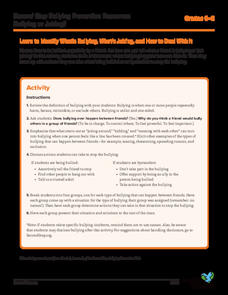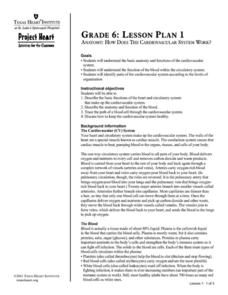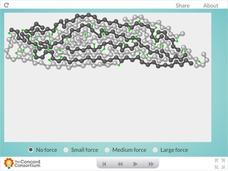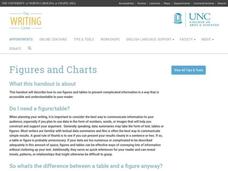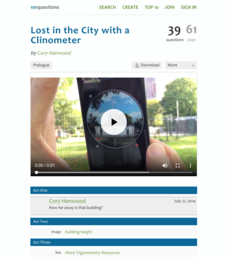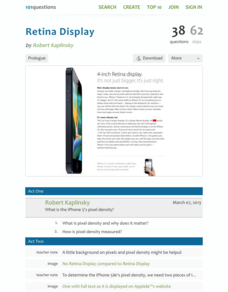K20 LEARN
Grandmother, What A Big Culture You Have!: Cultural Characteristics
A word splash activity introduces scholars to the lesson's theme—cultural characteristics. First, in examining Little Red Riding Hood by The Brothers Grimm, learners highlight the cultural characteristics and then spot the...
BioEd Online
The Skeleton
Don't be chicken to try a lesson plan that compares the anatomy of birds to humans. Read the background information so you don't have to wing it when it comes to the anatomy of a chicken. Prepare cooked chicken bones by soaking them in a...
CCSS Math Activities
Picking Apples
Pick the resource while it's ripe. A performance task challenges young mathematicians to consider the costs of apple picking. They compare the costs for two different orchards for different situations.
California Department of Education
Tension and Release: Creating Mindful Harmony (CTE)
Perhaps the Doobie Brothers said it best when they sang, "Listen to the Music." With the third of four lessons from the Changing One's Tune: A Music Therapy STEM Integrated Project series, pupils discover the connection between music and...
Committee for Children
Learn to Identify What’s Bullying, What’s Joking, and How to Deal With It
A quick lesson takes a look at the differences between bullying and joking. Through whole-class discussion, scholars identify between the two behaviors and brainstorm actions to take to cease bullying behavior. Small groups share with...
American Chemical Society
What’s the Difference between Baking Soda and Baking Powder?
Introduce pupils to chemical reactions. Using the hands-on lesson, learners experiment with substances that combine to form a gas. Different substances react to form different amounts of gas, leading to a discussion about the particles...
Heidi Songs
Penguin Word Families
These silly penguins are just asking to be colored in! Similar to paint-by-numbers, kids color in these penguins based on the words written on the drawing. They color in anything in the -it family black and the -in family orange.
Texas Heart Institute
Anatomy: How Does the Cardiovascular System Work?
How can the circulatory system compare to a city map? Pupils distinguish the "roadways" and "vehicles" of the cardiovascular system, compare the anatomy and function of veins and arteries, and review different types of blood cells with...
Charleston School District
Negative Exponents
What happens if the exponent is negative? The resource takes a look at a problem two different ways, with one resulting in a negative exponent. The approach provides an explanation of how to evaluate negative exponents.
EngageNY
Secant Lines; Secant Lines That Meet Inside a Circle
Young mathematicians identify different cases of intersecting secant lines. They then investigate the case where secant lines meet inside a circle.
Willow Tree
Patterns - Numbers, Shapes, etc.
Find the pattern is the name of the game! Learners examine different patterns represented by numbers, shapes, and words. They must describe the pattern, predict the result in a given position, and find an equation that...
EngageNY
Translating Graphs of Functions
If you know one, you know them all! Parent functions all handle translations the same. This lesson examines the quadratic, absolute value, and square root functions. Pupils discover the similarities in the behavior of the graphs when...
Noyce Foundation
On Balance
Investigate the world of unknown quantities with a creative set of five lessons that provides problem situations for varying grade levels. Each problem presents a scenario of fruit with different weights and a balance scale. Using the...
EngageNY
More Division Stories
Don't part with a resource on partitive division. Continuing along the lines of the previous lesson, pupils create stories for division problems, this time for partitive division problems. Trying out different situations and units allows...
Concord Consortium
Tire Forces
No need to tread lightly on this piece of tire rubber! Polymer science pupils observe the behavior of rubber with an interesting interactive. Users apply three different levels of force to a sample, then watch how they affect the polymer...
101 Questions
Bed, Bath, and Beyond Coupon
More money for me! Scholars explore two different coupons for Bed Bath & Beyond, one for 20 percent off and one for $5 off an item. Using some concrete examples, they determine conditions for when each coupon would be more beneficial.
University of North Carolina
Figures and Charts
Sometimes words aren't the best way to get information across to the reader. The eighth handout in the 24-part Writing the Paper series describes different type of figures and charts to display complex information in a paper....
California Department of Education
Due Dates, Deadlines, and Decisions
Get high schoolers thinking about their post-secondary plans with a lesson plan that teaches them how to navigate the application and financial aid process. They create a junior/senior calendar identifying time-sensitive tasks,...
101 Questions
Lost in the City with a Clinometer
Come look at trigonometry from a different angle. To begin a simple activity, scholars view a video of someone using a clinometer to find the angle of elevation to the top of a building. They then use a diagram that shows the building's...
101 Questions
Retina Display
Learners calculate the pixel density of a specific cell phone using the concept of similarity. They use information from the cell phone's website to make their calculations and then compare their results to the posted information.
Concord Consortium
Graphical Depictions
Parent functions and their combinations create unique graphical designs. Learners explore these relationships with a progressive approach. Beginning with linear equations and inequalities and progressing to more complex functions,...
CCSS Math Activities
Smarter Balanced Sample Items: 8th Grade Math – Claim 4
A math model is a good model. A slide show presents 10 sample items on modeling and data analysis. Items from Smarter Balanced illustrate different ways that Claim 4 may be assessed on the 8th grade math assessment. The presentation is...
EngageNY
Reading for Gist and Answering Text-Dependent Questions: Local Sustainable Food Chain
Readers use sticky notes and a Reading Closely: Guiding Questions handout to record the gist of a different section (pages 161-166) in The Omnivore’s Dilemma. They then pair up and share their ideas. To end the lesson, readers complete...
Flipped Math
Calculus AB/BC - Selecting Procedures for Derivatives
Don't get lost trying to memorize all those derivative rules. Scholars review the different methods at their disposal to determine derivatives from Units 2 and 3. They fill out a graphic organizer and then complete a set of practice...




